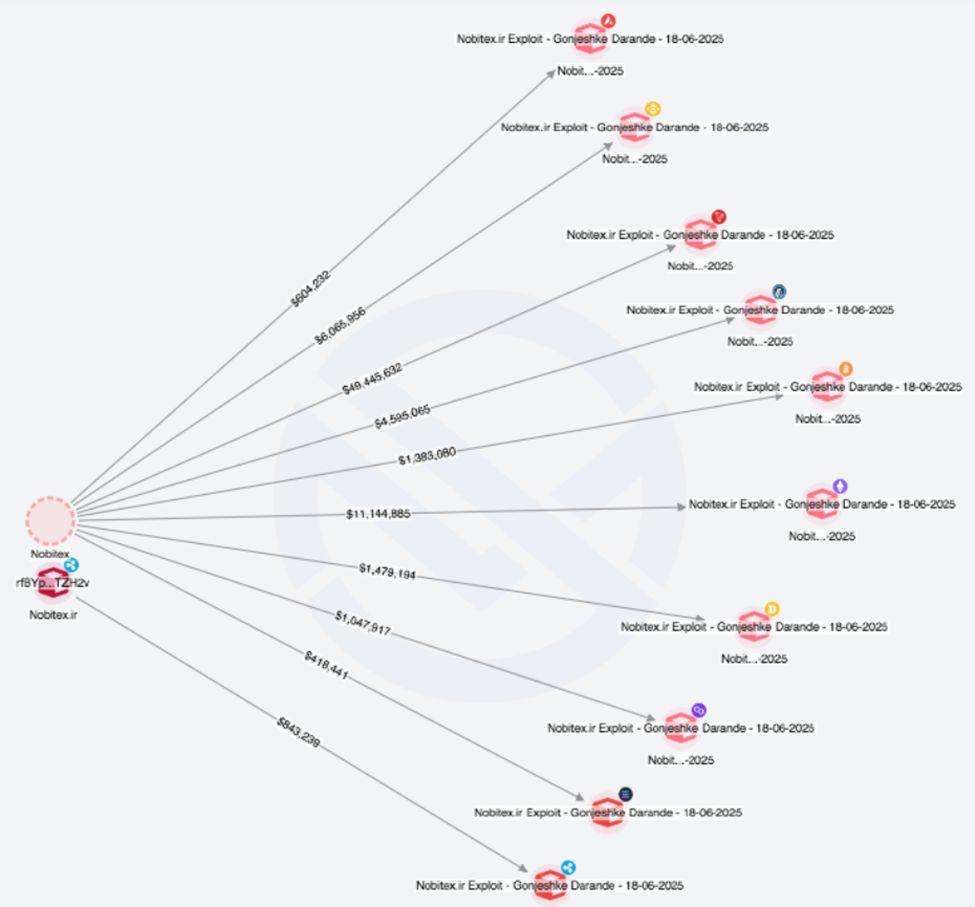Israel-Iran Tensions Hit Crypto as the Conflict Moves On-Chain
The $81 million hack of Nobitex reveals blockchain’s growing role in geopolitical conflicts, as state actors increasingly target crypto infrastructure for both warfare and messaging.
As military tensions escalate between Israel and Iran, crypto and blockchain are being pulled into the conflict, not just financially, but digitally.
The recent $81 million hack of Iranian crypto exchange Nobitex marked a turning point, with experts warning that blockchain has officially become a geopolitical battleground.
Blockchain Becomes a New Front in Israel-Iran Conflict
Merkle Science acknowledged that Gonjeshke Darande carried out the exploit, which aligns with BeInCrypto’s recent report on the hacktivist group.
However, according to Merkle Science, a blockchain analytics and predictive risk platform, the attack was a message that blockchain is now a geopolitical front line.
“This wasn’t just theft. It was a message. Blockchain is now a geopolitical front line,” the firm stated.
This remark came after their forensic tracker revealed how the stolen funds moved across multiple addresses. It points to this attack going beyond a typical cybercrime incident, to a politically motivated move.
 Visual of the hack distribution from Merkle Science’s Tracker. Source:
Merkle Science on X.
Visual of the hack distribution from Merkle Science’s Tracker. Source:
Merkle Science on X.
Indeed, BeInCrypto reported Gonjeshke Darande group’s motivation, clamping down on Iran as part of Israel’s perceived war against Iran-fueled terrorism.
The group is widely believed to be linked to Israeli military intelligence, though Israel maintains ambiguity about its involvement.
“The Nobitex exchange is at the heart of the regime’s efforts to finance terror worldwide, as well as being the regime’s favorite sanctions violation tool…Nobitex doesn’t even pretend to abide by sanctions. It publicly instructs users on how to use its infrastructure to bypass sanctions. The regime’s dependence on Nobitex is evident from the fact that working at Nobitex is considered valid military service, as it is vital to its efforts,” the hacker group said on Wednesday.
The attack on Nobitex shows a trend of weaponizing crypto infrastructure in state-level and asymmetric conflicts.
Attacks like the Nobitex hack highlight a growing trend where crypto infrastructure is increasingly being weaponized in geopolitical cyber campaigns.As these conflicts evolve, so does the risk to the systems we all rely on.#Crypto #CyberSecurity #ThreatIntel #PolySwarm $NCT
— PolySwarm(@PolySwarm) June 18, 2025
This shift has major implications. Investors now face a playing field where their assets are subject to market volatility and increasingly vulnerable to targeted geopolitical strikes.
If the countries hosting major crypto exchanges become involved in conflict, the platforms may become high-profile targets.
“Failure to lead in blockchain and cryptocurrency exposes nations to economic disruption, regulatory gaps, and security vulnerabilities, risks those adversarial states are ready to exploit,” Merkle Science warned in a report.
Blockchain Leadership Becomes Strategic
The report also notes that blockchain’s decentralization is not absolute. This means nation-states can exploit their infrastructure through traffic filtering or validator capture, turning a strategic asset into a liability.
Indeed, the strategic role of blockchain is already evident in US defense initiatives. The Navy’s use of SIMBA Chain to track F/A-18 aircraft parts proves the technology’s real-world utility in securing critical systems.
At the same time, its anonymity and speed have made crypto a powerful tool for illicit actors. From laundering to sanctions evasion, cryptocurrencies have long been favored by rogue states and terrorist groups.
In 2024 alone, crypto-related hacks and exploits resulted in $1.49 billion in losses, more than double the previous year. Groups like North Korea’s Lazarus have financed operations by exploiting vulnerabilities in crypto platforms, including the $1.5 billion Bybit heist.
The Nobitex hack adds another layer of urgency, highlighting the role of digital assets in modern warfare. As sanctions tighten and conventional finance becomes harder to access, state-aligned hackers and insurgent groups increasingly turn to crypto to send a message.
For Gonjeshke Darande, it is to retaliate against Iran’s regional aggression and its proxies, such as Hezbollah and the Houthis, while minimizing civilian harm
Disclaimer: The content of this article solely reflects the author's opinion and does not represent the platform in any capacity. This article is not intended to serve as a reference for making investment decisions.
You may also like
DOJ weighs Dragonfly’s role in Tornado Cash co-founder Roman Storm trial
Share link:In this post: The DOJ is considering charges against Dragonfly executives over their 2020 investment in Tornado Cash. Roman Storm’s defense team plans to call doctors and a Chainalysis expert before closing arguments. Dragonfly’s managing partner denies wrongdoing and warns that prosecution could harm crypto investment in privacy tools.

Trump says trade deal with EU has only a 50-50 chance
Share link:In this post: President Trump said there’s only a 50-50 or lower chance of reaching a trade agreement with the EU, even though Brussels is eager to strike a deal. The EU is pushing for a compromise to avoid U.S. tariffs set to begin August 1 but hasn’t revealed what it might offer in return. Some suggest modeling a deal on the U.S.-Japan trade pact. Trump will open a new golf course in Scotland and meet UK Labour leader Keir Starmer and Scottish First Minister John Swinney to discuss Ukraine, de

Injective brings SharpLink’s $1.3 billion ETH treasury fully on-chain

Nativo Resources to Establish Bitcoin Treasury in 2025

